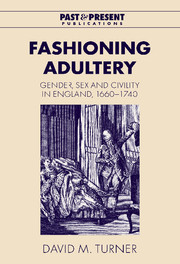Book contents
- Frontmatter
- Contents
- Acknowledgements
- Note on the text
- List of abbreviations
- Introduction
- 1 Language, sex and civility
- 2 Marital advice and moral prescription
- 3 Cultures of cuckoldry
- 4 Sex, death and betrayal: adultery and murder
- 5 Sex, proof and suspicion: adultery in the church courts
- 6 Criminal conversation
- Conclusion
- Bibliography
- Index
- Past and Present Publications
2 - Marital advice and moral prescription
Published online by Cambridge University Press: 01 July 2009
- Frontmatter
- Contents
- Acknowledgements
- Note on the text
- List of abbreviations
- Introduction
- 1 Language, sex and civility
- 2 Marital advice and moral prescription
- 3 Cultures of cuckoldry
- 4 Sex, death and betrayal: adultery and murder
- 5 Sex, proof and suspicion: adultery in the church courts
- 6 Criminal conversation
- Conclusion
- Bibliography
- Index
- Past and Present Publications
Summary
Marriage, the family and household order were matters of central social concern in early modern England. For people of all ranks marriage was the principal means of transferring property of all kinds, connections and expertise across generations and social groups, while the household-family was a primary unit of production and consumption. Getting married was likened to a form of civilising process in which ‘brutish lusts’ were tamed and transformed into lawful, procreative sexuality. It marked the transition from youth to adulthood and conferred special roles and responsibilities on both men and women. As an important unit for the education and socialisation of children, the family had wider social and political importance. More than a ‘private’ institution, the family was regarded in the sixteenth and seventeenth centuries as the foundation upon which the strength, prosperity and well-being of the whole nation depended. Moralists and social commentators acclaimed well-ordered familial relations as the hallmark of great civilisations, the matrimonial bond fortifying the body politic against the corrupting influences of ‘luxuries and effeminacies’. The marriage covenant was analogous to the ‘love and union between Christ and his Church’, while the patriarchal family was idealised as the mirror of ‘discipline and a happy government’ in the commonwealth, the basis of ‘peace and quiet’ in the kingdom. Though the analogy between the family and the state arguably carried less symbolic freight after 1688, there is no doubt that marriage remained important to notions of respectability in civil society.
- Type
- Chapter
- Information
- Fashioning AdulteryGender, Sex and Civility in England, 1660–1740, pp. 51 - 82Publisher: Cambridge University PressPrint publication year: 2002



